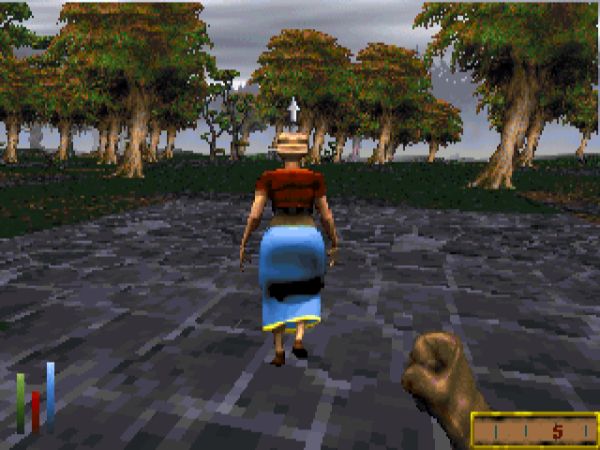
Little known fact: If you save your game in Daggerfall and reload it, the trees will have moved. So will the people, and they will have new names. Both the forest and the villagers are randomly created anew each time you arrive. One thing is constant though: The women all have big butts.
In the last days of MS-DOS, just before Windows 95 changed everything, some of the greatest games ever were made. Developers used to floppy disks saw the rapid spread of hard disks and CD-ROM and suddenly found they had unlimited space to make the ultimate game. At the same time, the video cards of the time allowed easily recognizable pictures, but not the lifelike detail that soon came to fill our CD-ROMs and hard disks to the brim. And so, this era saw games of a scope never seen before or since, a scope so epic that it would take lifetimes to fully explore them.
Daggerfall is one such game. A single-player role playing game with an interface similar to the massive multiplayer RPGs which were just emerging, it contains terrain larger than Great Britain, although luckily you can also use the map to travel directly to any known location. The land is dotted with literally thousands of locations, from farms to cities, from small crypts to enormous dungeons which may take a full workday to explore. (Not that I recommend using your workday so!) Towns and cities have a range of shops from the traditional blacksmiths to clothes shops and even banks, where you can stash your heavy gold coins or borrow money and buy a local house or a ship.
Magic is an important force in Daggerfall, and the Mages Guild not only sell spells, members can also buy magical items or even make their own spells and magical items once they gain some rank in the guild. They may even get a specialist to teleport them to another part of the country in an instance, or summon a powerful demon which may know about ancient artifacts with unique powers. As an alternative to making your own magical gear, you may try visiting different guild chapters, as they have their own specialties. I am not sure how many there are of them, but probably in the hundreds.
Temples offer various services, such as healing and selling potions, and eventually making your own potions. (One of them specializes in magic items instead, for those who for some reason don’t join the mages guild.) In some provinces you may also join a knightly guild which will let its champions sleep for free in any inn or tavern in the province, or even give high-ranking members a local house for free. (You can, as mentioned, buy your own house, but they are rather pricey.) The Fighters’ guild has no such grand reward, but they let you sleep in the guild house and repair your gear for you.
Daggerfall was ahead of its time. Like other massive games from this time, such as the strategy game Master of Magic, it is partly remembered for its massive bugs, although most of these were patched later. A few features were put in the game but never activated (or perhaps they were deactivated), such as furniture shops and prostitutes. You never see the ships actually sail, either. The dozen or so different languages have very little effect in the game. Still, one must admire the ambition of such an epic undertaking. Even though the later Elder Scrolls games were also known to be incredibly massive, they pale compared to the scope of Daggerfall.
And almost 20 years later, it is still a truckload of fun to play. The graphics look horrible for a few minutes until the imagination kicks in, the blocky sprites smooth out, and you start to see the land the way the developers imagined it, an immense world filled with wonder and danger, where you are left alone to create your own fate. Good, bad, you’re the one with the sword … or the magic … or the ability to speak with centaurs and nymphs. An endless adventure has just begun.









